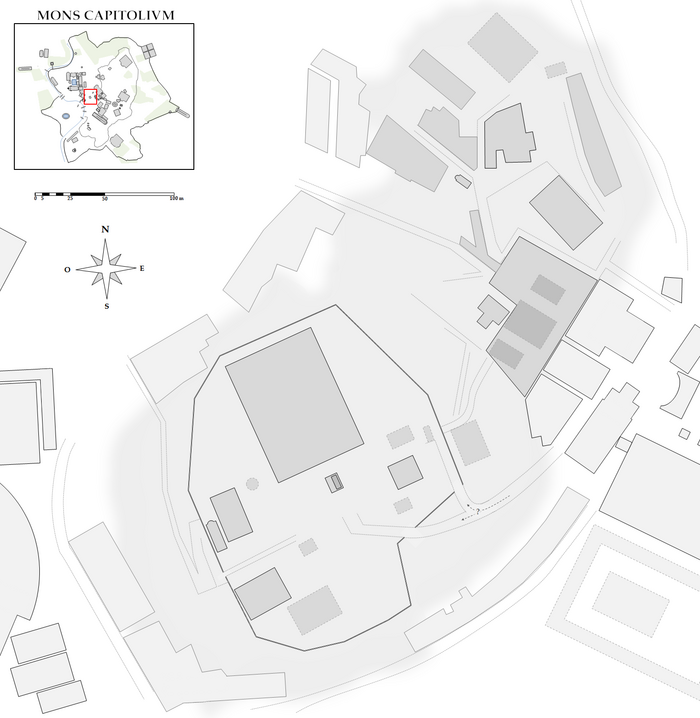Juno Monetas tempel

Juno Monetas tempel var en helgedom i det antika Rom, tillägnad gudinnan Juno.[1] Det grundades år 344 f.Kr. Det var ett av flera tempel i Rom tillägnade Juno, men också ett av de viktigaste och mest välkända templen i det antika Rom.
Historia
Templet uppfördes sedan Lucius Furius Camillus år 345 f.Kr. hade avgivit ett löfte att uppföra ett tempel åt Juno om han fick gudarnas stöd inför ett avgörande slag i kriget mot aurunkerna, och sedan segrade i denna konflikt. Förteckningen över Roms konsuler, Libri Lintei, förvarades i templet. Från år 273 f.Kr. var också Roms myntverk inhyst på dess område, och Juno Moneta blev då skyddsgudinna för mynt och statens finanser, därav namnet mynt. Namnet Juno Moneta blev Junos tillnamn i denna egenskap, men Moneta hade ursprungligen stått för en lokal latinsk gudinna, som hade dyrkats strax utanför staden och sedan slogs ihop med Juno, då templet uppfördes i staden.
Templet är associerat med legenden om Junos heliga gäss, som 390 f.Kr. ska ha varnat Marcus Manlius Capitolinus inför kelternas anfall, men detta tempel var då ännu inte uppfört. Det fanns dock flera andra Junotempel i Rom, bland annat Juno Sospitas tempel.
Karta
| Plan över Capitolium under antiken |
|---|
Fori Imperiali Jupiter Conservators tempel Altare Centus Gradus Janustemplet Juno Sospitas tempel Spestemplet Tullianum |
Källor
Noter
- ^ Littlewood, R. Joy (2006) (på engelska). A Commentary on Ovid's Fasti, book 6. Oxford: Oxford University Press. ISBN 0-19-156920-8
Tryckta källor
- Claridge, Amanda (1998) (på engelska). Rome: An Oxford Archaeological Guide. Oxford Archaeological Guides, 99-2662277-1. Oxford: Oxford University Press. sid. 48. ISBN 0-19-288003-9
- Coarelli, Filippo (1980) (på italienska). Guida archeologica di Roma (3). Milano: Arnoldo Mondadori. sid. 241. OCLC 7187657
Media som används på denna webbplats
Författare/Upphovsman: Cassius Ahenobarbus, Licens: CC BY-SA 4.0
Map of the ancient Capitoline Hill
Författare/Upphovsman: Internet Archive Book Images, Licens: No restrictions
Identifier: historyofallnati05wrig (find matches)
Title: A history of all nations from the earliest times; being a universal historical library
Year: 1905 (1900s)
Authors: Wright, John Henry, 1852-1908
Subjects: World history
Publisher: (Philadelphia, New York : Lea Brothers & company
Contributing Library: University of California Libraries
Digitizing Sponsor: Internet Archive
View Book Page: Book Viewer
About This Book: Catalog Entry
View All Images: All Images From Book
Click here to view book online to see this illustration in context in a browseable online version of this book.
Text Appearing Before Image:
ts splendidtemple on fire, and had murdered Sabinus before the eyes of the despair-ing Vitellius. On the next morning the maddened troops took up themarch upon the city. The Vitellians everywhere gave way before theIllyrians, and in the narrow streets the massacre continued till after-noon. When at last the citadel was stormed and the guard of Vitelliusbutchered, Vitelhus himself was discovered on the Palatine, and putto death. Nearly 50,000 men fell on that day. On the followingmorning the senate assembled CDecember 21), and in due form con-ferred upon Vespasian the imperial title ; but the pillage of the cityonly ceased when Mucianus arrived in Rome, and with a strong handput down the arrogance of the soldiers, sending the ))est of the victori-ous legions to Syria or the Rhine. Vespasian remained several months in the East, but the struggle onthe Rhine and in Judea continued for a much longer time. On the Rhine,the blockade of Vetera was with great difficulty relieved by the twenty-
Text Appearing After Image:
THE GALLIC INSURRECTION. 119 second legion under Dilliiis Vocula. But the news of Cremona had adisastrous effect. The leaders declared for Vespasian, but the soldiers,though acquiescing, were bitterly discontented, and their mutin(uis temperweakened the army, while Civilis, throwing off the mask, continued thecontest with increased energy, and was successful iu persuading the BelgianCelts to desert Rome. Under these circumstances the war continued fora long time around Vetera, which Civilis again blockaded in the beginningof A.D. 70, while Vocula, after the mutinous lioman relieving armymurdered its general, the old Hordeouius Flaccus, at Novaesium, wascompelled to retire to Mayence. In Gaul the news of the destructionof the Capitol produced intense excitement. The Druids everywherepreached that the palladium of Rome was lost, and that the power hadnow passed to the Celtic nation. Three leaders of Celtic auxiliaries,Julius Classicus and Julius Tutor of the Treviri, and Julius Sabinus
Note About Images


